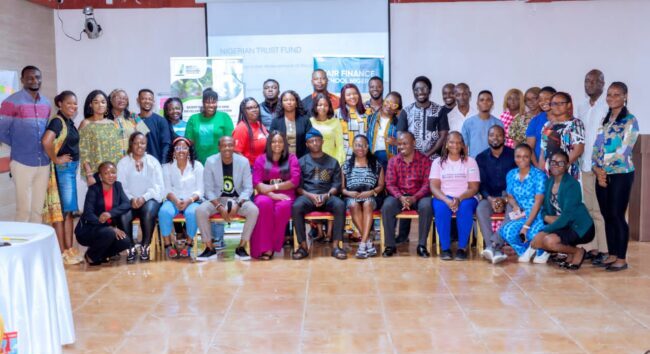No fewer than 50 civil society organisations and climate activists from across Nigeria have called for sustainable finance and environmental justice to mitigate the effects of climate change and environmental degradation across Nigeria.
They made the call in Port Harcourt at a two-day Fair Finance School Nigeria workshop aimed at empowering activists to drive sustainable finance practices and environmental justice, which was organised by the Quest for Growth and Development Foundation with support from Fair Finance Southern Africa.
The event brought together representatives from Lagos, Abuja, Delta, Bayelsa, Enugu, Imo State, Abia State, Akwa-Ibom, and Rivers State, fostering a united front against climate change and environmental degradation.
The Coordinator of Quest for Growth and Development Foundation, Smith Nwokocha, explained in his opening remarks that the workshop used a model of storytelling, live experience, and practical campaigning to capacitate the public on climate finance and drive meaningful change and fair and equitable financing in Africa.
He disclosed that the essence of the Fair Finance School Nigeria is to empower CSOs and Climate Justice activists to learn and organise a step-down training of worship across their space, and also that issues around finance are simplified.
In his presentation, Dr Patrick Uduma, who spoke on the positionality of finance, also explained that climate finance refers to any financing for credible climate action.
“This includes activities such as renewable energy projects, energy efficiency improvements, reforestation efforts, climate-friendly infrastructure development, and initiatives to enhance resilience to climate impacts.”
He added that in 2015, 125 countries committed to mitigating climate change through adaptation and financing.
“Climate finance aims to mobilise resources that support actions promoting climate change mitigation and adaptation.”
“The United Nations Framework Convention of Earth Summit in 1992 formalised that countries with more financial resources than others should be providing such finance, bearing in mind the principle of “common but differentiated responsibility and respective capabilities”.
According to the United Nations, the proper utilisation of sufficient climate finance can ensure climate justice by Setting a new goal for climate finance and doubling finance for countries to adapt to climate impacts Protecting all people from climate disasters with early warning systems by 2027.
Also, Blessing Udofa (Nigerian Bar Association Treasurer) in her presentation titled, Human Rights and Climate Change: Understanding the Nexus and Implications for Climate Finance, said the objective of the workshop is to equip Civil Society Organisations (CSOs) with knowledge on human rights, climate change, and climate finance, focusing on the Nigerian context.
While explaining basic terms of climate change and human rights connectivity, Udofa noted that human rights, climate change, and climate finance are interconnected.
She, therefore, called on CSOs to advocate for human rights-based approaches to climate finance, ensuring transparency, accountability, and inclusivity.
Meanwhile, Rita Kigbara said climate finance acts as the fuel for a spaceship to fight against climate change
According to her, the bigger and more complex the ship, the more reliable and efficient the fuel must be.
“Where do we get it from and who should put in how much from themselves—this is the complexity of the discussion around climate finance.”
“There is no universal definition. However, it is generally considered as any financing for credible climate action.”
“It could be local, national or transnational financing—drawn from public, private and alternative sources of financing—that seeks to support mitigation and adaptation actions that will address climate change.”
“The goal of climate finance is to mobilise resources to support actions that contribute to green growth or climate-resilient development,” she said.
Meanwhile, the Eze Ikemba 1 of Etche Land in Rivers State, Prof. Promise Obinna Onyeche, lamented that the exploration of oil and gas in the communities by the International Oil Companies (IOCs) began to harm the eco-system and affect the fertility of the soil.
He said the effects of climate change are caused by human activities mainly, and it affects nature
“Nature is serene, nature is peaceful and when you encroach on the serenity of nature, nature will react and if it does react, you can’t withhold it. The type of climate change impact in the Niger Delta is different from other parts of Nigeria,” he said
ALSO READ THESE TOP STORIES FROM NIGERIAN TRIBUNE
